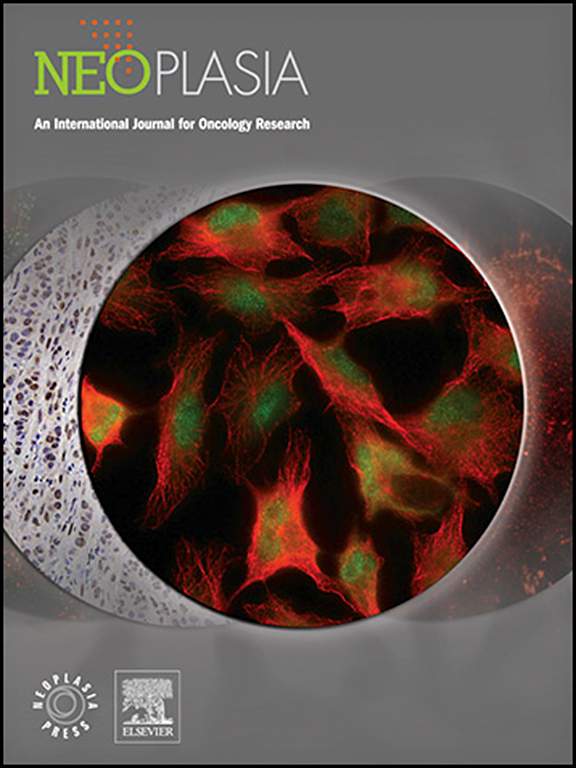Targeting monopolar spindle kinase I (Mps1 or TTK) induces radiosensitization in syngeneic models of triple negative breast cancer (TNBC) and potentiates type I interferon (T1IFN) signaling
IF 7.7
2区 医学
Q1 Biochemistry, Genetics and Molecular Biology
引用次数: 0
Abstract
Triple negative breast cancer (TNBC) is an aggressive breast cancer subtype that disproportionately impacts Black women and has limited effective therapeutic options. Consequently, there is an urgent need to develop novel approaches for the treatment of TNBC. Previously, we identified monopolar spindle kinase I (Mps1 or TTK), which is upregulated in TNBC patients after radiotherapy, as a potential therapeutic target. We found that TTK inhibition sensitizes human TNBC to radiotherapy (RT) both in vitro and in vivo; however, these studies were performed in immunodeficient models. Here, we extended those studies into syngeneic murine models of TNBC using two TTK inhibitors: empesertib and the novel TTK inhibitor CFI-402257 (also known as luvixasertib) that was recently granted FDA fast track approval in breast cancer. These studies demonstrate that TTK inhibition radiosensitizes syngeneic murine models of TNBC and increases the production of micronuclei and aneuploidy. Mechanistic studies demonstrate that TTK inhibition and RT alter the tumor immune microenvironment of TNBC by modifying the production of antitumoral type I interferon (T1IFN). In vivo, TTK inhibition sensitizes syngeneic models of TNBC to RT. Furthermore, combining TTK inhibition and RT also potentiates T1IFN signaling, suggesting that combination treatment may induce antitumoral immunity in immunocompetent models. Taken together, these studies demonstrate that TTK inhibition enhances radiosensitivity and TTK inhibition with RT modulates the immune landscape of TNBC. Collectively, this combination may represent a novel therapeutic strategy to improve outcomes for patients with TNBC by both direct tumor cytotoxicity and by promoting an immune-responsive environment.
靶向单极梭形激酶I (Mps1或TTK)在三阴性乳腺癌(TNBC)的同基因模型中诱导放射致敏,并增强I型干扰素(T1IFN)信号
三阴性乳腺癌(TNBC)是一种侵袭性乳腺癌亚型,对黑人妇女的影响不成比例,有效的治疗选择有限。因此,迫切需要开发治疗TNBC的新方法。先前,我们发现单极梭形激酶I (Mps1或TTK)在TNBC患者放疗后上调,作为潜在的治疗靶点。我们发现TTK抑制使人TNBC对放射治疗(RT)在体内和体外均增敏;然而,这些研究是在免疫缺陷模型中进行的。在这里,我们将这些研究扩展到使用两种TTK抑制剂的TNBC同基因小鼠模型:emesertib和新型TTK抑制剂CFI-402257(也称为luvixasertib),后者最近获得了FDA快速通道批准用于乳腺癌。这些研究表明,TTK抑制使TNBC的同基因小鼠模型放射致敏,并增加微核和非整倍体的产生。机制研究表明,TTK抑制和RT通过改变抗肿瘤I型干扰素(T1IFN)的产生来改变TNBC的肿瘤免疫微环境。在体内,TTK抑制使TNBC同属模型对RT增敏。此外,TTK抑制和RT联合也增强了T1IFN信号,表明联合治疗可能在免疫活性模型中诱导抗肿瘤免疫。综上所述,这些研究表明TTK抑制增强了放射敏感性,TTK与RT的抑制调节了TNBC的免疫景观。总的来说,这种组合可能代表了一种新的治疗策略,通过直接的肿瘤细胞毒性和促进免疫应答环境来改善TNBC患者的预后。
本文章由计算机程序翻译,如有差异,请以英文原文为准。
求助全文
约1分钟内获得全文
求助全文
来源期刊

Neoplasia
医学-肿瘤学
CiteScore
9.20
自引率
2.10%
发文量
82
审稿时长
26 days
期刊介绍:
Neoplasia publishes the results of novel investigations in all areas of oncology research. The title Neoplasia was chosen to convey the journal’s breadth, which encompasses the traditional disciplines of cancer research as well as emerging fields and interdisciplinary investigations. Neoplasia is interested in studies describing new molecular and genetic findings relating to the neoplastic phenotype and in laboratory and clinical studies demonstrating creative applications of advances in the basic sciences to risk assessment, prognostic indications, detection, diagnosis, and treatment. In addition to regular Research Reports, Neoplasia also publishes Reviews and Meeting Reports. Neoplasia is committed to ensuring a thorough, fair, and rapid review and publication schedule to further its mission of serving both the scientific and clinical communities by disseminating important data and ideas in cancer research.
 求助内容:
求助内容: 应助结果提醒方式:
应助结果提醒方式:


